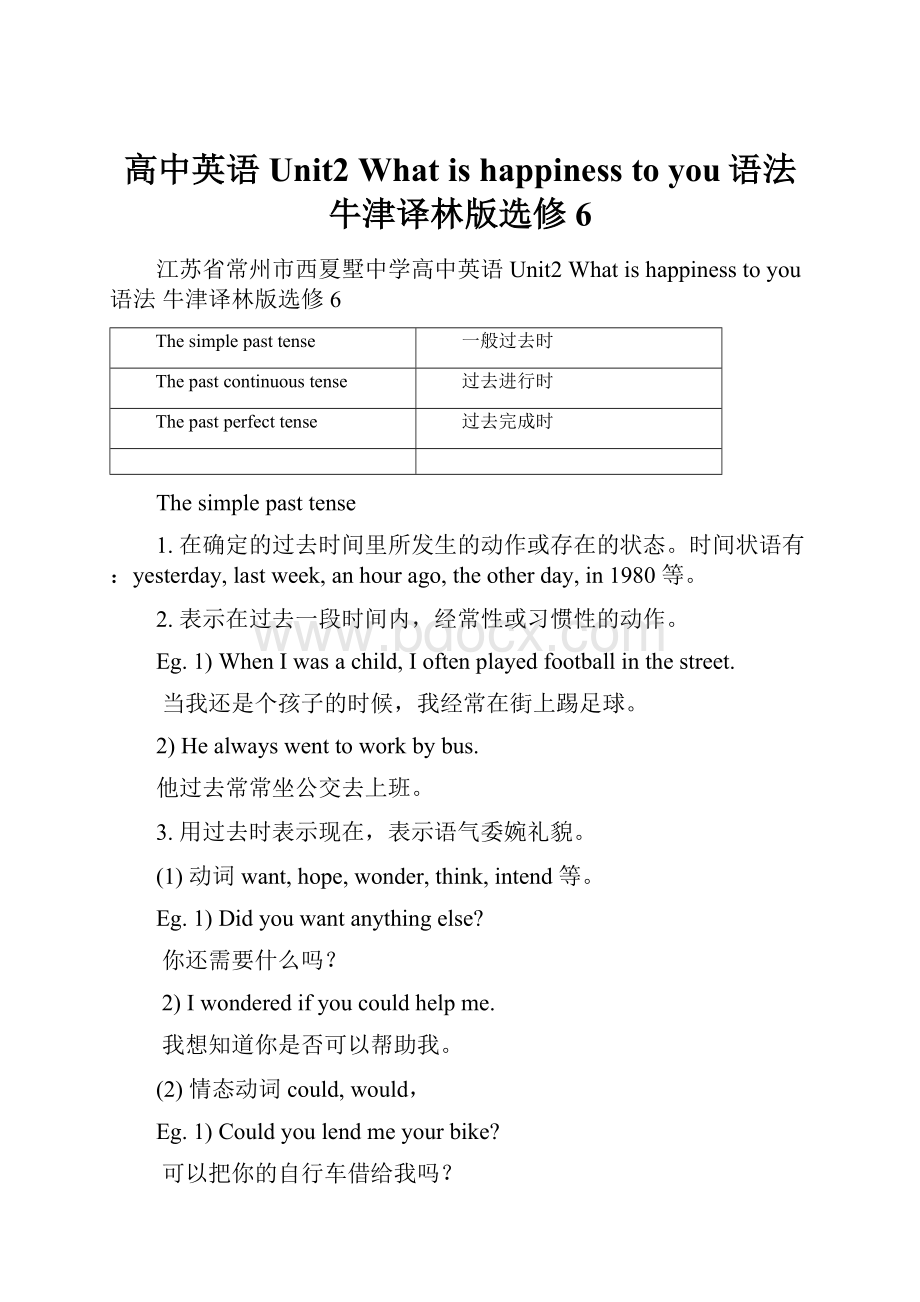高中英语 Unit2 What is happiness to you语法 牛津译林版选修6.docx
《高中英语 Unit2 What is happiness to you语法 牛津译林版选修6.docx》由会员分享,可在线阅读,更多相关《高中英语 Unit2 What is happiness to you语法 牛津译林版选修6.docx(15页珍藏版)》请在冰豆网上搜索。

高中英语Unit2Whatishappinesstoyou语法牛津译林版选修6
江苏省常州市西夏墅中学高中英语Unit2Whatishappinesstoyou语法牛津译林版选修6
Thesimplepasttense
一般过去时
Thepastcontinuoustense
过去进行时
Thepastperfecttense
过去完成时
Thesimplepasttense
1.在确定的过去时间里所发生的动作或存在的状态。
时间状语有:
yesterday,lastweek,anhourago,theotherday,in1980等。
2.表示在过去一段时间内,经常性或习惯性的动作。
Eg.1)WhenIwasachild,Ioftenplayedfootballinthestreet.
当我还是个孩子的时候,我经常在街上踢足球。
2)Healwayswenttoworkbybus.
他过去常常坐公交去上班。
3.用过去时表示现在,表示语气委婉礼貌。
(1)动词want,hope,wonder,think,intend等。
Eg.1)Didyouwantanythingelse?
你还需要什么吗?
2)Iwonderedifyoucouldhelpme.
我想知道你是否可以帮助我。
(2)情态动词could,would,
Eg.1)Couldyoulendmeyourbike?
可以把你的自行车借给我吗?
4.用在条件句中表示与现在或将来事实不符的虚拟语气。
Eg.1)IfIwereabird,IwouldflytoBeijing.
如果我是一只小鸟,我愿意飞去北京。
2)Ifhewereherenow,wecouldturntohimforhelp.
如果你刚才在这里,我们可以向他求救。
注意下列句型:
◎Itistimesb.didsth.“时间已迟了;早该……了”,
Eg.Itistimeyouwenttobed. 你该睡觉了。
◎would(had)rathersb.didsth.“宁愿某人做某事”
Eg.I'dratheryoucametomorrow.我宁愿你明天来。
Thepastcontinuoustense
1.过去进行时表示过去某一时刻或某一段时间正在进行的动作。
常与atthattime,thewholemorning,alldayyesterday,fromninetotenlastevening等连用。
Eg.1)Whatwashedoingthistimeyesterday?
他昨天这个时候在干什么?
2)In2001,shewasstudyinginauniversity.2001年,她在大学学习。
2.过去进行时的主要用法是描述一件事发生的背景;一个长动作发生的时候,另一个短动作发生。
1)Mybrotherfellwhilehewasridinghisbicycleandhurthimself.
我弟弟在骑车的时候跌倒受伤了。
2)Itwasrainingwhentheyleftthestation.
当他们离开车站的时候正在下雨。
Thepastperfecttense
1.过去完成时表示过去某一时刻或者某一动作之前完成的动作或状态;句中常用by,before,until,when等词引导的时间状语。
1)Bytheendoflastyearwehadbuiltfivenewhouses.
到去年底,我们一家盖好了5栋新房子。
2)Ihadlearnt5000wordsbeforeIenteredtheuniversity.
在我上大学前,我已经学习了5000个单词。
2)过去完成时的动词还可以表示过去某一时刻之前发生的动作或者状态持续到过去某个时间或者持续下去。
Eg.1)Beforeheslept,hehadworkedfor12hours.
他连续工作了12个小时才睡觉。
2)HehadbeeninthiscollegeforfiveyearsbeforeIcamehere.
在我来这之前,他已经在这个学校待了5年。
3)在told,said,knew,heard,thought等动词后的宾语从句。
Eg.Shesaid(that)shehadneverbeentoParis.
她曾说她从没去过巴黎。
4)在过去不同时间发生的两个动作中,发生在先,用过去完成时;发生在后,用一般过去时。
Eg.Whenthepolicearrived,thethieveshadrunaway.
当警察到的时候,小偷已经跑掉了。
5)表示意向的动词,如hope,wish,expect,think,intend,mean,suppose等,用过去完成时表示“原本……,未能……”
Eg.Wehadhopedthatyouwouldcome,butyoudidn't.
我们曾希望你可以来,但是你没有。
6)过去完成时的时间状语before,by,until,when,after,once,assoonas。
Eg.Bythetimehewastwelve,Edisonhadbegantomakealivingbyhimself.
当爱迪生12岁的时候,他开始靠自己生活。
Practice1
一、用动词的适当形式填空。
1.—I have seen the film “Titanic”already.
—When __________ you __________ it?
(see)
—The day before yesterday.
2.HetoldmethatMr Black __________ in Beijingsince fiveyearsago.(live)
3. We ____________ trees last Sunday.
So far we _________________ over 3,000 trees there.(plant)
4.—Didyouseeamaninblackpassbyjustnow?
—No,sir.I_____________anewspaper.(read)
5.—DidAlanenjoyseeinghisoldfriendsyesterday?
—Yes,hedid.He_____________hisoldfriendsforalongtime.(notsee)
6.I_____therelittlemorethanaweekwhenIsettoworkwiththescientist.(be)
7.—Isthereanythingwrong,Bob?
Youlooksad.
—Oh,nothingmuch.InfactI________myfriendsbackhome.(thinkof)
二、句子翻译。
1.我上周去看爷爷和奶奶了。
2.你告诉我之前,我已经看过这部电影。
3.妈妈昨晚没看电视,她去阿姨家了
4.昨天这个时候,我们班的同学在操场上踢足球.
Futuretenses
Thesimplefuturetense
一般将来时
Thefuturecontinuoustense
将来进行时
Thefutureinthepast
过去将来时
Thefutureperfecttense
将来完成时
Thesimplefuturetense
1.shall用于第一人称,常被will所代替。
will在陈述句中用于各人称,在征求意见时常用于第二人称。
Eg.1)WhichparagraphshallIreadfirst?
我应该先读哪一段?
2)Willyoubeathomeatseventhisevening?
你今晚七点会在家吗?
2.begoingto+不定式,表示将来。
a.主语的意图,即将做某事或打算做某事。
Whatareyougoingtodotomorrow?
你明天打算干什么?
b.计划,安排要发生的事。
Theplayisgoingtobefinishednextmonth.
话剧将在下个月完成。
c.有迹象要发生的事
Lookatthedarkclouds,thereisgoingtobeastorm.
看乌云,将会有一场暴风雨。
3.be+不定式表将来,按计划或正式安排将发生的事。
WearetodiscussthereportnextSaturday.
我们要在下周六讨论这个报告。
4.beaboutto+不定式,意为马上做某事。
HeisabouttoleaveforBeijing.
他将出发去北京。
注意:
beaboutto不能与tomorrow,nextweek等表示明确将来时的时间状语连用。
☆begoingto/will的用法之比较:
用于条件句时,begoingto表将来,will表意愿。
例:
1)Ifyouaregoingtomakeajourney,you'dbettergetreadyforitassoonaspossible.
如果你打算旅行,你最好尽快做准备。
2)Nowifyoutakeoffyourclothes,wewillfitthenewclothesonyouinfrontofthemirror.
如果你现在脱掉衣服,我们将在镜子前为你穿上新衣服。
☆beto和begoingto的用法之比较:
beto表示客观安排或受人指示而做某事。
而begoingto则表示主观的打算或计划。
Eg.Iamtoplayfootballtomorrowafternoon.(客观安排)
I'mgoingtoplayfootballtomorrowafternoon.(主观安排)
Thefuturecontinuoustense
1.表示在将来某一时刻或某段时间正在进行的动作。
如:
Eg.1)ThistimetomorrowIshallbeflyingtoGuangzhou.
明天的这个时候我将飞去广州。
2)Whatwillyoubedoingateighttomorrowmorning?
明天早上八点你会干什么?
3)We'llbewatchingtelevisionallevening.
我们今晚将一直看电视。
2.表示将来被客观情况所决定的动作或者按照安排将要发生的动作。
Eg.1)We'llbehavingteaafterdinnerasusual.
我们将照常在饭后喝茶。
2)Theleaveswillbefallingsoon.
叶子将要落下。
3)Weshallbehavingameetingtomorrowmorning.
我们明早将要开会。
4)I’llbetakingmyholidayssoon.
我很快将休假。
3.将来进行时常用的时间状语:
soon,tomorrow,thisevening,onSunday,bythistime,tomorrow,intwodays,tomorrowevening等。
1)Bythistimetomorrow,I'llbelyingonthebeach.
到明天的这个时候,我将会躺在沙滩上。
注意:
将来进行时不用于表示"意志",不能说I'llbehavingatalkwithher.
Thefutureinthepast
基本形式:
would/should+动词原形
(其中would用于各种人称,should常用于第一人称)。
1)Theyweresuretheywouldwinthefinalvictory.
他们确信他们将获得最终的胜利。
2)Hedidn'texpectthatweshould(would)allbethere.
他没想到我们都要去那里。
过去将来时的一些其它表达形式:
1.was/were+goingto+动词原形
Hesaidhewasgoingtotry.
他说他将尝试。
2.was/were+to+动词原形
TheysaidtherailwaywastobeopenedtotrafficonMayDay.
他们曾说火车将在五一节向公众开放。
3.was/wereaboutto+动词原形
Wewereabouttogooutwhenitbegantorain.
我们刚要出发就下雨了。
4.过去进行时(一般多为动作概念较强的动词,如go,come,leave,start,open,begin等)也可用于表示将来。
Ididn'tknowwhentheywerecomingagain.
我不知道他们什么时候会再来。
用法注意点:
1.在时间和条件状语从句中,常用一般过去时来表示过去将来时。
Hesaidhewouldcometoseeyouwhenhehadtime.
他们说如果他有时间将来看你。
2.“would+动词原形”可表示过去习惯性的动作。
不管什么人称,都可用would。
Whenhewasachild,hewouldgetupearly.
当他还是个孩子的时候,他起床很早。
Thefutureperfecttense
将来完成时用来表示在将来某一时间以前已经完成的动作。
与before+将来时间或by+将来时间连用,也可与before或bythetime引导的现在时的从句连用。
例:
1)Bytheendofthisweek,Ishallhavefinishedthebook.
到本周末,我将看完这本书。
2)Thechildrenwillhavegonetosleepbythetimewegethome.
当我们到家的时候,孩子们将已经睡觉了。
注意:
使用这种时态时,多会涉及两个动作或状态,一个在前,一个在后;叙述前面的动作或状态,动词要用将来完成时;叙述后面的动作或状态,动词要用一般现在时。
3)Wewillhavecompletedtheworkbeforeyoucome.
在你到之前我们将完成工作。
4)Wewillhaveplayedballwhenyoucome.
在你到的时候我们将已经打完球。
(或whenyoucome,wewillhaveplayedball.)
5)Hesaysthathewillhavegraduatedfromauniversitybeforeyoureturnhome.
他说在你到家之前,他将从大学毕业。
Practice2:
1.There__________ameetingtomorrowafternoon.
A.willbegoingtoB.willgoingtobeC.isgoingtobeD.willgotobe
2.Charlie________herenextmonth.
A.isn’tworkingB.doesn’tworkingC.isn’tgoingtoworkingD.won’twork
3.He______verybusythisweek,he_____freenextweek.
A.willbe;isB.is;isC.willbe;willbeD.is;willbe
4.Thetrain________at11.
A.goingtoarriveB.willbearriveC.isgoingtoD.isarriving
5.他说他将在大门口等我的。
6.我们打算明天去冲浪。
7.明天这个时候我们正在上英语课。
Exercises:
1.—Look!
Howwonderfulmycaris!
Oh,Jack.Whatareyouthinkingabout?
Don’tyoulikeit?
—I’msorryI______anyremarkaboutitintime.Icertainlythinkit’ssmart.
A.wasn’tmaking B.don’tmake
C.won’tmake D.didn’tmake
2.TofindthestreetwhereIlivedinmychildhoodisnoeasytaskbecausethecity______sorapidlyalltheseyears.
A.ischanging B.haschanged
C.willhavechanged D.willchange
3.He______quitewell,buthehasn’thadtimetoswimsincethissummer.
A.willswim B.haveswum C.swam D.swims
4.Jimmysaidthathewouldcometopickmeup,buthe____bynow.
A.hasn’tturnedup B.doesn’tturnup
C.won’tturnup D.hadn’tturnedup
5.I’mterriblysorryforbeinglate,butI_____thewrongbus.
A.catch B.hadcaught C.caught D.catching
6.Thetruth,sir,isthattheoldman______acrosstheroadwhenmycarhithim.
A.wastowalk B.hadbeenwalking
C.walked D.waswalking
7.Ireallydon’tthinkRosewillbeupset,butIwillgoandseeherincaseshe_____.
A.is B.does C.willbe D.hasbeen
8.Thecomputersmadebyourcompanysellbest,butseveralyearsagonoonecouldhaveimaginedtheroleinthemarketsthatthey_________.
A.wereplaying B.weretoplay
C.hadplayed D.played
9.—Kateisinhospital.
—Oh,really?
I_______.________visither.
A.didn’tknow;I’llgoand B.don’tknow;I’llgoand
C.don’tknow;I’mgoingto D.didn’tknow;I’mgoingto
10.—Where_______theguidebook?
Ican’tseeitanywhere.
—I_______itrighthere,butnowit’sgone.
A.didyouput;haveput B.hadyouput;haveput
C.haveyouput;put D.wereyouputting;put
11.—Doyouliveinthiscity?
—No,we______itforholidays.
A.justvisit B.justvisited C.arejustvisiting D.havevisited
12.—Howistheoldmannow?
—Sorry,he______thoughtheydidalltheycouldtosavehim.
A.wasdead B.haddied C.hasbeendead D.died
13.Thelakewillbefurtherpollutedunlesssomemeasures______.
A.willbetaken B.aretaken C.weretaken D.hadbeentaken
14.I’mafraiditwill